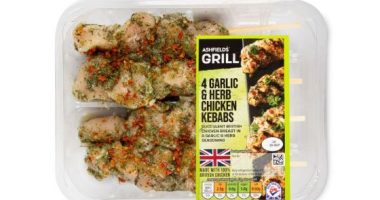A SAVVY woman has revealed how she’s bagged £6,000 worth of free products, and anyone can do it.
Neeta Pankhania, a social media consultant, has always been looking for ways to boost her income.
So when the 43-year-old from Leicester came across LatestFreeStuff she decided to give it a go.
The website lists items shoppers can get for free, as companies are giving them away as part of their marketing strategy.
This is because when people try samples they are more likely to go and buy them, or tell their friends and family about them.
Anyone willing to test and review products can also get products sent to them – some of them high value items.


In most cases, although not always, you can keep them afterwards, saving you money on buying them yourself.
It’s seen Neeta keep hold of high-end hoovers, tablets, phones and dishwashers.
She’s nabbed designer perfumes and bundles of other health and beauty products too.
And her “jackpot” product was a £1,250 Miele dishwasher, the most expensive item she’s received yet.
Most read in Money
Neeta has been bagging freebies since 2015, and ramping up the product testing since summer last year.
In 2022 she tested around 90 products while this year has done 150 in just nine months.
She’s landed around £6k worth of products since starting out and roughly half of that since 2022.
“I was shocked at the amount of free products I could get,” she told The Sun.
“I bumped into the LatestFreeStuff website in 2015,” she said.
“That’s when product testing clicked. I thought, ‘oh my god’ these companies are out there that want us to test their products in real time.
“I tried it a few times and got a few things here and there, and then it grew from there.”
Neeta says on average she spends an hour a day either looking for products to test, or doing the testing itself.
She has tried everything from tech and food items, to health and beauty products and toys.
Since last summer, she has received an Indesit washing machine worth £250, Google Pixel Tablet that retails at £599, a Shark vacuum worth £329. and Sonos speakers worth £500.
Plus she’s had free perfume and aftershave, make up, beauty creams and even plant pots turn up at her door.
She’s received Armani Si aftershave worth £92, Evelom Cream that usually retails at £90 and Sanctuary beauty sets worth £54.
But she also regularly donates some of the free items she’s received to food banks and within the local community.
“Giving back is very important to us,” she said. “I donate sanitary products, food items I get, non-perishable stuff.”
“I just feel you should give back. I gifted the washing machine to my mum as well.”
How does product testing work?
Marketing companies, supermarkets and major brands regularly send out products to consumers to either test or increase shoppers’ awareness of them.
You can sign up directly with brands or with organisations that run tests for other companies, usually via their websites.
Neeta sources all her products through LatestFreeStuff which verifies any freebies and doesn’t post spam offers.
But there are a host of other websites you can choose from, such as Clicks Research, Tesco Home Panels and Toluna.
You are then sent products to try in return for survey feedback.
Most companies target specific demographics, so you won’t be selected for everything.
And usually you will have to fill in a short questionnaire to see if you’re the right fit.
For example, some brands only send products to women with children under a certain age while other target dads under 40.
How you actually apply for each product varies, but for Neeta it’s a case of applying separately via LatestFreeStuff.
She finds a product, clicks on it, then usually has to enter her personal details such as name and address and then any specifics relating to the product.
If she is applying for a beauty product, for example, she has to enter her skin type or hair colour.
She also has to enter her home address so the company sending the product knows where to ship to.
But this isn’t always the case. Neeta explained some smaller freebies require just a few personal details.
If she is product testing and her profile meets the company’s requirements, she usually receives an email that the item is on its way.
But some companies don’t let you know whether something is en route.
Neeta said: “Sometimes the items just turn up at your home address and it is a massive surprise.
“For example, my Shark Hoover was a major surprise as I had been with the panel for two years and only just got chosen!”
Once the product has arrived, you have to test it, writing up a detailed review which you submit to the company.
She often has to upload pictures and videos too, and sometimes companies ask her to share snaps of the product on her social media accounts.
What are the pros and cons?
The obvious pro to product testing is that you get a host of products to keep for free.
Often, they’ll be up to date and modern as well as the companies are looking to test the products before launching them on a wider scale.
But there are some downsides.
It can be time consuming applying for products and you can sometimes not hear anything back for months.
Neeta said product testing works for her as she’s freelance and can choose her own hours.
But someone working a 9-5 might struggle.
She said: “With product testing, some of the items you only have a short window to apply for them.
“Some are on a first-come-first serve basis too so you have to be fast.
“If I was working a 9-5 and didn’t have my phone on my desk I would miss these opportunities.
“It’s a bit of a lottery, but you’ve got to be in it to win it.”
You don’t always get to keep the products after testing them too, so bear that in mind.
Neeta’s top tips
If you’re thinking of giving product testing a go, Neeta has some top tips.
Timing
You’ll want to time when you apply as you’re more likely to pick up certain items at certain times.
For example, Neeta said September can be a good time to get into product testing as that’s when a lot of brands are looking to get reviews on Christmas-themed items such as toys, confectionery and beauty products.
Be honest with reviews
Neeta prides herself on offering honest and comprehensive reviews, saying 100% of hers have made it on to brands’ websites.
So while it might be tempting to leave overly positive feedback on a product, make sure what you say is a fair reflection of the user experience.
Neeta said by not giving a genuine response, it could mean issues with a product aren’t picked up and lead to it being recalled after being distributed more widely.
Join up to Facebook and WhatsApp groups
There are plenty of Facebook product testing websites you can sign up to where the admins regularly post items.
LatestFreeStuff, for example, has its own Facebook page which regularly posts items to snap up.
But you can also get alerts about new opportunities via WhatsApp groups as well.
Neeta said this method might be best suited to someone who has a 9-5 job and is “on the go”.
She added it’s best to check whether a Facebook page, WhatsApp group or product testing website is legitimate first though.
You can check customer reviews on sites like Trustpilot and what people are saying about it on social media.
Martin Lewis’ MoneySavingExpert has a round up of product testing websites too.


Neeta also urged anyone to avoid Facebook groups asking for your gas or electricity usage or bank details as this is generally a red flag – you should never give your personal or bank details out to anyone.
She also said to not give out your personal mobile number so you are not inundated with nuisance calls and texts.
Do you have a money problem that needs sorting? Get in touch by emailing [email protected].
You can also join our new Sun Money Facebook group to share stories and tips and engage with the consumer team and other group members.










